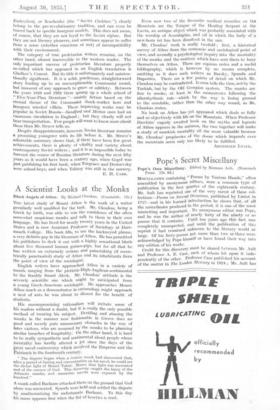A Scientist Looks at the Monks
Black Angels of Athos. By Michael Choukas. (Constable. 12s.) THE latest study of Mount Athos is the work of a writer peculiarly well qualified for the task. Mr. Choukas, being a Greek by birth, was able to win the confidence of the often somewhat suspicious monks and talk to them in their own language. He has lived for nearly twenty years in the United States and is now Assistant Professor of Sociology at Dart- mouth College. His book fills, to 'use the hackneyed phrase, a very definite gap in the literature of Athos. He has permitted his publishers to deck it out with a highly sensational blurb about five thousand human guinea-pigs, but for all that he has written an extremely serious and painstaking (if eccen- trically punctuated) study of AthoS and its inhabitants from the point of view of the sociologist. • English writers have approached Athos in a variety of moods ranging from the pietistic-High-Anglican-sentimental Mr. Choukas' attitude is the le the frankly Smart Aleck. might be anticipated from severely scientific one which in a young Greek-American sociologist. He approaches Mount Athos much as a demonstrator in entomology might approach a 'nest of ants he was about to dissect for the benefit of students.
His uncompromising rationalism will irritate some of his readers without a doubt, but it is really the only possible method of treating his subject. Deriding and abusing the monks in the manner now fashionable in Greece does no good and merely puts unnecessary. obstacles in the way of later visitors, who are assumed by the monks to be planning similar breaches of hospitality: On the other hand, it is hard to be really sympathetic and sentimental about people whoSe fuentality has hardly altered a jot since the days of the great navel controversy which involved the Emperor and the patriarch in the fourteenth century.
" The dispute began when a certain monk had discovered that, alter a period of fasting, and 'concentration on his navel, he could see the divine light of Mount' Tabor. hence that light was uncreated and of the essence of God. This discovery caught the fancy of the Athonite monks; and ' monachic navels were exposed by the . hundred."
kmonk called Barlaam attacked them on the ground that God alone was uncreated. Synods were held and settled the dispute by anathematising the unfortunate Barlaam. To this day his name appears first when the list of heretics is read. Even now two of the favourite medical remedies on the Mountain are the Tongue of the Healing Serpent at the Lavra, an antique object which was probably associated with the worship of Aeseulapius, and oil in which the body of a new-born rat has been dissolved in the sun.
Mr. Choukas' work is really twofold ; first, a historical survey of Athos from the economic and sociological point of view, and secondly a psychological inquiry into the mentality of the monks' and the motives which have sent them to bury themselves on Athos. There are copious notes and a useful bibliography, which is however by no means eomplete, omitting as it does such writers as Barsky, Spunda and Dapontes. There are a few points of detail on which Mr. may, be contradicted.. Choukas Ivcron tells the time, not by the Turkish, but by the Old Georgian system. The monks are free to smoke, at least in the monasteries following the idiorrhythmie rule—which by the way is losing ground to the cenobitic, rather than the other way round, as Mr. Choukas states.
No book on Athos has yet appeared which deals so fully and so objectively with life On the Mountain. When Professor Dawkins' eagerly awaited book on the myths and legends of Athos appears in the autumn, the two together will make a study of monkish mentality all the more valuable because Mr. Choukas' prophecies of the doom which impends over the mountain seem only too likely to be fulfilled.
ARCHIBALD LYALL.


































 Previous page
Previous page